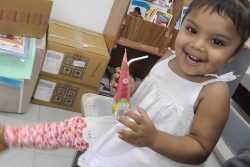Thursday’s unspeakable fire tragedy that befell Tracy Flu and claimed the lives of three of her children: 8-year-old Timothy Kippins, 6-year-old Triston Kippins and one-year-old Zhalia Flue, should serve as a signpost that there are deep pockets of poverty, cleavages, contradictions and failures of governance in all parts of society.
No matter how assiduously President Ali and his government try to weave the narrative of a rising Guyana brimming with hope on the billions of barrels of oil equivalent in the Atlantic, the threads of this tale will fray and snap unless some order and comfort is brought to the lives of the thousands like Ms Flue.
Thus far there is no sign from this government of a comprehensive evaluation of the pressing needs of the thousands who live on the edge. Those thousands continue to be battered on a daily basis by the galloping rise in the cost of living driven mainly by spiralling gas prices, international supply chain problems and other exogenous factors. Scattershot, arbitrary interventions like those announced for sugar workers, farmers and those living in the hinterland and riverain areas won’t cut it and risk accreting resentment that certain communities are benefiting over others for example the bauxite workers of Berbice who suffered years of brutal treatment by Russia’s RUSAL which has had longstanding and uninterrupted cosy ties with important sections of the ruling PPP/C.
There is a convergence in Ms Flue’s tragedy of the social maladies that have engulfed society. At a reported age of 23, she is a mother of four and apparently a single parent living in the community of Barnwell on the East Bank of Demerara which is remote from services and the artery for which is a muddied dam that the Fire Service could not traverse on the fateful night.
Yet, Ms Flue has to make a living to upkeep herself and her children. How is she to do this? Apparently, if reports are accurate, she has to work as a guard at night, having to leave her young children on their own. The guard services are significantly populated by young, middle-aged and older women who have little choice as they are mostly single parents and single grandparents and those are the only jobs available to them.
Aside from the truth that the community of Barnwell itself could have been more caring of the plight of Ms Flue and her children what about the local government tiers? What about the nearest Neighbourhood Democratic Council in identifying the needs of its residents and finding avenues to help them. What about the Region Four council? What about the Ministry of Human Services which has launched many programmes to help women like Ms Flue? Has it had contact with her and her community?
While Ms Flue also has to be accountable for her choices in life, what she desperately needed was some means of livelihood that kept her close to her children and obviated the worst-case scenario: having to leave them unattended while she worked the graveyard shift. She needed daycare help and likely assistance with ensuring her children were able to go to school. How are the needs of the neediest in this country being factored into the US$600m+ that will be swallowed up by the national budget in oil proceeds this year? Or is the government’s intention to splurge on dance hall fests like the tumultuous ‘Baderation’, ‘Stink and Dutty’ events and the Caribbean Premier League?
By her own account, Ms Flue was also the victim of domestic violence and complained about being menaced and threatened even though numerous complaints were made to the authorities.
“I was in a relationship with (an) abusive boyfriend, I go to the station countless time to make report, this month-end suppose to be we court day and he tell me that how anytime I go to court it go be the last day I ever see a police and how he gon kill me.”
This is another of the misogynistic traumas that so many women in this country have to endure on a regular, if not daily basis. How are the various programmes of the government and its international partners faring in addressing this scourge?
In these columns – even before the advent of oil – this newspaper has urged that poverty mapping be undertaken of the impecunious in the country and ways found to alleviate their conditions without making them dependent on handouts. Ms Flue was clearly willing to work but could find nothing more suitable. This was where the government needed to help and to serve its people.
As it is there are still important questions about this tragedy that need to be answered. Under what circumstances were these three children left alone in their home? Had this happened before? Where is the other parent?
It is also truly amazing that on May 26 – a national holiday – that the Guyana Fire Service was able to definitively say that the fire was electrical in origin. Is there an electricity supply in the area? Why were the children apparently unable to leave the dwelling after the fire started?
Ms Flue’s nightmare should be a mobilisation call for all those who have some part to play, like Kafka’s axe to the frozen sea within us to ensure that everything possible can be done to prevent a recurrence.





